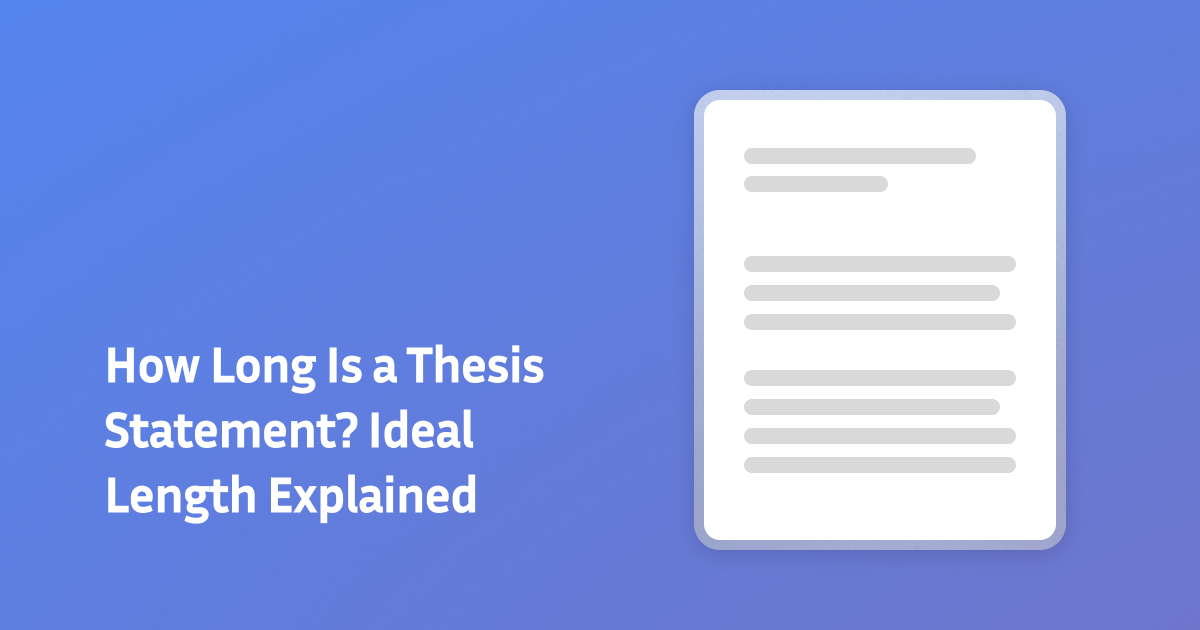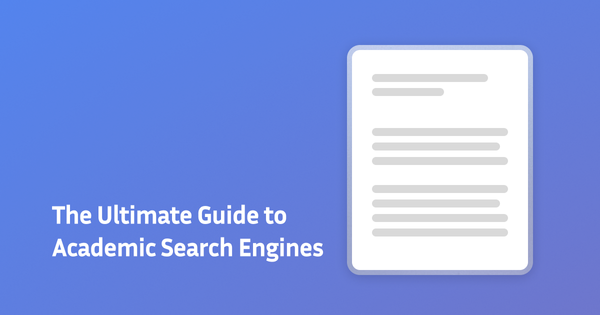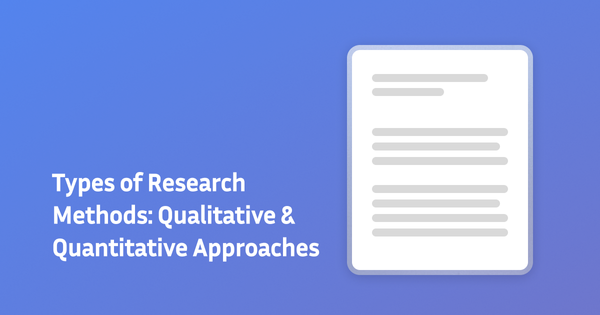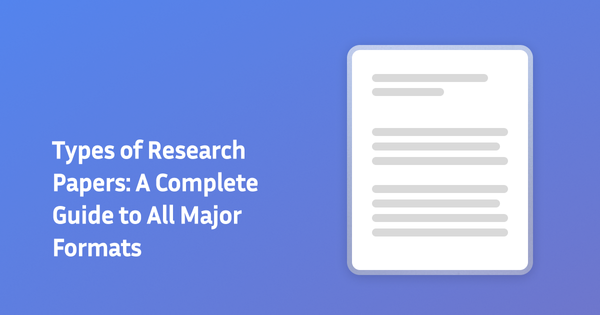How Long Is a Thesis Statement? Ideal Length Explained

I still remember staring at my computer screen, cursor blinking, as I tried to craft the perfect thesis statement for my first college paper. Was my sentence too short? Too long? Too vague? Too specific? The struggle was real!
If you're wrestling with similar questions, you're definitely not alone. The thesis statement is that crucial sentence (or sometimes two) that can make or break your paper, and figuring out the right length can feel like trying to solve a puzzle without all the pieces.
In this guide, I'll walk you through everything you need to know about thesis statement length, based on both my personal experience and what professional academics recommend. No more guessing games!

Ideal Thesis Statement Length: How Many Words or Sentences?
Let's cut to the chase: most effective thesis statements are 1-2 sentences long, totaling about 20-50 words.[1]
But here's the thing—thesis statements aren't one-size-fits-all. Their ideal length depends on several factors, including:
- The complexity of your argument
- Your academic level (high school, undergraduate, graduate)
- Your paper's overall length
- Your discipline or field of study
The real goal isn't hitting a specific word count—it's crafting a statement that's concise enough to be clear but detailed enough to preview your argument.
Why the Right Thesis Length Is Crucial for Academic Writing
Your thesis statement serves as the roadmap for your entire paper. When it's too short, it can be vague or underdeveloped. When it's too long, it can become unwieldy and confusing.
I learned this lesson the hard way when my professor returned my paper with a note: "Your thesis tries to say too much and ends up saying nothing clearly." Ouch! That feedback changed how I approach thesis writing forever.
The right length helps you achieve the perfect balance between: [2]
- Specificity (presenting a precise argument)
- Scope (covering the main points without getting lost in details)
- Clarity (being easily understood by readers)
Good and Bad Thesis Statement Length Examples
Let's look at some real examples to understand how length affects effectiveness:
Too Short (Under 10 words):
❌ "Social media has negative effects."
Why it doesn't work: Too vague and general. What effects? On whom? In what context?
Just Right (About 25 words):
✅ "College students' excessive use of social media platforms negatively impacts their academic performance by reducing study time and disrupting sleep patterns."
Why it works: Specific topic, clear position, and previews the main points that will be discussed.
Too Long (Over 60 words):
❌ "This paper will examine how college students' excessive use of social media platforms like Instagram, TikTok, and Facebook has been shown to have numerous negative impacts on their academic performance, specifically by reducing the amount of time they dedicate to studying, creating distractions during class and homework sessions, disrupting healthy sleep patterns essential for learning, and contributing to increased stress levels and reduced focus, as demonstrated by recent studies."
Why it doesn't work: Too wordy and reads more like an abstract than a thesis. Includes too many details that drown out the main argument.
How Long Should a Thesis Be? Word Count by Grade Level
As you progress through your academic journey, thesis statement expectations often change: [3]
High School Level:
- Usually 1 sentence
- About 15-25 words
- More straightforward, less nuanced
Undergraduate Level:
- 1-2 sentences
- About 25-40 words
- More specific with some nuance
Graduate Level:
- Sometimes 2 sentences
- About 30-50 words
- More sophisticated with greater complexity and nuance
My writing professor once explained it like this: "As you advance academically, your thesis should mature from making simple claims to acknowledging the complexity of ideas while still maintaining clarity."
Thesis Length by Subject: Humanities vs Science vs Social Science
Different disciplines have different thesis statement conventions: [4]
Humanities (Literature, History, Philosophy):
- Often longer, more nuanced thesis statements
- May include interpretation aspects
- Example: "Toni Morrison's 'Beloved' uses the character of Beloved not only as a representation of historical trauma but also as a mechanism to explore how unresolved grief manifests physically, challenging readers to confront the embodied legacy of American slavery."
Sciences (Biology, Chemistry, Physics):
- Typically shorter, more direct thesis statements
- Focus on findings or relationships
- Example: "Increased concentrations of carbon nanotubes in soil significantly reduce earthworm population and activity, indicating potential ecological risks in agricultural applications."
Social Sciences (Psychology, Sociology, Political Science):
- Medium length with both empirical claims and interpretive elements
- Example: "The implementation of restorative justice practices in urban high schools reduces recidivism rates while simultaneously increasing students' sense of community belonging and institutional trust."
A Simple Formula to Write the Perfect-Length Thesis Statement
After years of wrestling with thesis statements (and helping others with theirs), I've developed a simple formula that hits the sweet spot for length and effectiveness:
Topic + Claim + Key Points/Significance = Perfect Thesis Statement

Let's break it down:
- Topic: The specific subject of your paper (not broad like "climate change" but focused like "carbon taxation policies in Scandinavian countries")
- Claim: Your argument or position on the topic
- Key Points/Significance: Brief mention of your main supporting points or why your argument matters
Using this formula typically results in a thesis that's the ideal length—not too short, not too long.
How to Tell If Your Thesis Statement Is Too Long
How do you know if you've gone overboard? Watch for these warning signs:
- You're using multiple commas and conjunctions to connect too many ideas
- You find yourself out of breath when reading it aloud
- You're listing specific evidence that belongs in body paragraphs
- You're explaining how you'll prove your point rather than just stating what your point is
- You've included background information that would be better placed in your introduction
My writing tutor gave me a brilliant test: "If you can't recite your thesis from memory, it's probably too long."
Signs Your Thesis Statement Is Too Short
On the flip side, here's how to tell if your thesis needs more development:
- It states a fact rather than an argument (e.g., "World War II ended in 1945")
- It's too general to guide a focused paper (e.g., "Plastic pollution is bad")
- It doesn't hint at your paper's structure or main points
- It lacks specificity about your unique angle or contribution
- It could apply to almost any paper on your topic
Tips for Trimming a Too-Long Thesis
If your thesis has ballooned beyond the ideal length, try these revision strategies:
- Delete redundant words and phrases (e.g., change "due to the fact that" to "because")
- Remove background information that can go elsewhere in your introduction
- Save specific examples for your body paragraphs
- Focus on your main argument and just 2-3 key supporting points
- Eliminate adverbs and adjectives that aren't essential
One of my professors suggested this exercise: "Write your thesis, then cut it in half. Then see if it still conveys your main point. You might be surprised how much clearer it becomes." [5]
Tips for Expanding a Too-Short Thesis
If your thesis is underdeveloped, try these techniques:
- Specify your subject more clearly (who/what/where/when)
- Add your "how" or "why" to deepen the claim
- Include 2-3 key supporting points that preview your paper's structure
- Acknowledge a counterpoint if appropriate for your academic level
- Add significance by briefly noting why your argument matters
Common Mistakes in Thesis Statement Length and Composition
After years of tutoring students and revising my own work, I've noticed certain mistakes that pop up again and again. Here are the most common thesis statement problems to watch out for:

1. The "Kitchen Sink" Thesis
This happens when you try to cram everything about your topic into your thesis statement. I had a student once who included six different main points in her thesis, making it nearly a paragraph long. Remember: your thesis introduces your argument, but the details belong in your body paragraphs.
Example: "This paper will examine how climate change affects polar bear populations, analyze government policies in Arctic nations, discuss the role of fossil fuel companies, evaluate conservation efforts, propose solutions including renewable energy, and consider the economic implications for indigenous communities."
Fix: Choose your 2-3 most important points and save the rest for your paper's body.
2. The "Captain Obvious" Thesis
These thesis statements state facts that no one would dispute rather than making an arguable claim.
Example: "World War II had significant impacts on many countries."
Fix: Take a position that someone could potentially disagree with: "While often portrayed primarily as a military conflict, World War II's most lasting impacts were economic, fundamentally restructuring global trade patterns for the remainder of the 20th century."
3. The "Mystery Thesis"
This happens when your thesis is so vague that readers have no idea what your specific argument or approach will be.
Example: "Social media has both positive and negative aspects."
Fix: Specify which aspects and take a clear position: "Although social media platforms facilitate connection across distances, they ultimately damage adolescent mental health by creating unrealistic comparison standards and replacing in-person social skill development."
4. The "Roadmap Gone Wild"
Some writers confuse a thesis with an outline, listing every step their paper will take rather than presenting the central argument.
Example: "First this paper will discuss background on renewable energy, then it will look at solar power advantages, next it will examine disadvantages, and finally it will make recommendations."
Fix: Focus on your argument instead of your paper's structure: "Despite higher initial investment costs, residential solar power systems in southwestern states provide both environmental benefits and superior long-term economic returns compared to continued reliance on conventional utilities."
5. The "Wishy-Washy Wonder"
These thesis statements try to avoid taking a clear position by using tentative language or acknowledging every possible viewpoint.
Example: "Social media might possibly have some impacts on teenagers that could potentially be concerning in certain contexts, though others might argue it has benefits as well."
Fix: Commit to a clear position: "The documented increases in teenage anxiety and depression over the past decade are significantly linked to social media use, particularly platforms that emphasize appearance and social comparison."
6. The "First Draft Forever"
Many writers craft a preliminary thesis statement and never revisit it, even after their paper's argument has evolved during the writing process.
I definitely made this mistake in my early college papers. I'd write an initial thesis, then my paper would develop in a slightly different direction, but I'd never go back and update the thesis to match what I'd actually argued.
Fix: Always compare your thesis to your completed paper and revise as needed to accurately reflect your actual argument.[6]
Real-Life Before and After Examples
Let's see these principles in action:
Example 1: Undergraduate Literary Analysis
Before (Too Short): "Shakespeare's Hamlet is about revenge."
After (Improved): "In Hamlet, Shakespeare explores how the pursuit of revenge corrupts the avenger, as the protagonist's obsession with vengeance ultimately leads to his moral deterioration and tragic downfall."
Example 2: Graduate-Level Political Science
Before (Too Long): "This dissertation argues that the implementation of participatory budgeting practices in mid-sized Brazilian municipalities between 1989 and 2004 led to significant changes in resource allocation patterns that benefited previously marginalized communities, specifically through increased investment in basic infrastructure like water, sanitation, and paved roads in informal settlements, while also creating new political opportunities for community leaders, especially women, to emerge as political candidates in local elections, although these effects varied considerably depending on the strength of local civil society organizations and the commitment of municipal executives to the process, as demonstrated through comparative case studies of twelve cities across three different regions."
After (Improved): "Participatory budgeting in mid-sized Brazilian municipalities (1989-2004) redistributed resources to marginalized communities and created political opportunities for new leaders, particularly women, with effectiveness contingent upon civil society strength and executive commitment."
Example 3: Undergraduate Psychology Paper
Before (Too Vague): "Music affects study habits."
After (Improved): "Background instrumental music enhances concentration and information retention in college students studying complex material, while lyrical music significantly impairs these same cognitive processes."
Example 4: Environmental Science Research Paper
Before (Too Wordy): "This paper examines the very serious and concerning problem of plastic pollution in our oceans, which has been getting worse over the past several decades due to increased production of single-use plastics and improper disposal methods, and looks at various cleanup technologies that have been developed in recent years by different organizations and their effectiveness at removing plastics from marine environments while also considering potential negative impacts these technologies might have on marine ecosystems and wildlife."
After (Improved): "Current ocean plastic cleanup technologies offer promising removal rates but present significant ecological trade-offs, suggesting that upstream prevention strategies may be more effective than downstream remediation efforts for addressing marine plastic pollution."
Example 5: Undergraduate History Paper
Before (Too Factual): "World War II ended in 1945 after the atomic bombings of Japan."
After (Improved): "The Truman administration's decision to use atomic weapons against Japan was motivated more by emerging Cold War strategic positioning against the Soviet Union than by the necessity to end the Pacific War quickly."
Common Questions About Thesis Statement Length
1. Can a thesis statement be two sentences?
Absolutely! Sometimes complex arguments need two sentences—one to state your position and another to introduce your key supporting points or significance. This is especially common at the graduate level or for complex humanities papers.
2. Does thesis statement length affect my grade?
Indirectly, yes. While there's no grade deduction specifically for length, a thesis that's too long or too short often indicates problems with focus or development that will affect your paper's clarity and persuasiveness.
3. Should I write my thesis statement first or last?
It's a common misconception that you must start with your thesis. Many experienced writers develop a working thesis to begin with, then revise it after completing their draft. As one of my professors wisely said, "Sometimes you need to write the paper to discover what your real argument is."
4. Does my field of study affect how long my thesis should be?
Yes! As mentioned earlier, humanities papers often have slightly longer, more nuanced thesis statements than scientific papers, which tend to be more direct and concise.
Final Thoughts: Quality Over Quantity
Remember that while length guidelines are helpful, the effectiveness of your thesis statement ultimately depends on its quality—how clearly it conveys your argument and sets up your paper.
One of my favorite writing mentors used to say: "A good thesis statement isn't measured in words but in impact. It should hit your reader like a well-aimed arrow—direct and powerful."
The perfect thesis length is whatever it takes to:
- Make your specific argument clear
- Preview your paper's structure
- Engage your reader's interest
- Avoid unnecessary detail
Next time you're crafting a thesis statement, focus less on hitting a specific word count and more on achieving this balance. Your readers (and your grades) will thank you!
References:
- Rosen, L. J. (2012). The academic writer's handbook (3rd ed.). Longman.
- Graff, G., & Birkenstein, C. (2021). They say / I say: The moves that matter in academic writing (5th ed.). W.W. Norton & Company.
- Lunsford, A. A. (2019). The St. Martin's handbook (9th ed.). Bedford/St. Martin’s.
- Turabian, K. L. (2018). A manual for writers of research papers, theses, and dissertations (9th ed.). University of Chicago Press.
- Williams, J. M., & Bizup, J. (2016). Style: Lessons in clarity and grace (12th ed.). Pearson.
- Booth, W. C., Colomb, G. G., & Williams, J. M. (2016). The craft of research (4th ed.). University of Chicago Press.





